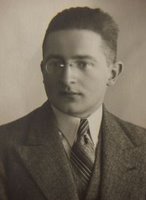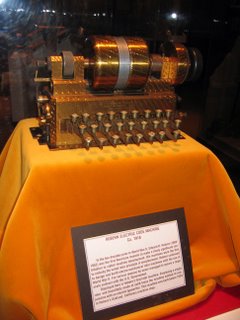Marian Rejewski on Wikipedia
 The Wikipedia article on Polish mathematician Marian Rejewski is currently going through the process to become a so-called "Featured Article", vetted entries that are eventually promoted on the main page and elsewhere.
The Wikipedia article on Polish mathematician Marian Rejewski is currently going through the process to become a so-called "Featured Article", vetted entries that are eventually promoted on the main page and elsewhere.Feel free to read the article and add any comments. The page for the Featuring process can be found here.
Despite having something of a girl's name, Rejewski was a veritable geek hero, solving the wiring of the German Enigma machine using some funky maths. It's more than possible that, without Rejewski's results, the British at Bletchley Park would have had little, if any, success with Enigma.
Rejewski also had a more exciting wartime experience than his counterparts at Bletchley Park, who were all off playing rounders in relative safety. From September 1940, Rejewski worked with a small unit on breaking Nazi ciphers from within occupied (well, Vichy) France, under the continual threat of discovery and arrest. After being nearly discovered by a detector van equipped with a radio antenna, the unit was evacuated. Aided by the French resistance, Rejewski worked his way to the border and attempted to cross over into Spain. He didn't have much luck at this point: robbed by his guide at gunpoint, captured by Spanish police only hours after crossing the border, and then interred for three months in prison.
After his release, he made his way to Britain. You might assume he would join the codebreakers at Bletchley Park on Enigma, since their work had built on his. Instead, he was assigned to a unit working on low-level codes; a decision that one former British codebreaker described as "like using racehorses to pull wagons". It's difficult to tell what motivated this apparent injustice -- perhaps a need for security, particularly since the British had developed more advanced techniques than those of Rejewski, and the future of Poland itself was uncertain. It's also possible that the relevant authorities did not know of the Polish contribution to the British work. Most of the few that had known were no longer immediately involved with Bletchley Park.
Regardless, Rejewski deserves to be remembered as one of the "greats" in crypto history.


